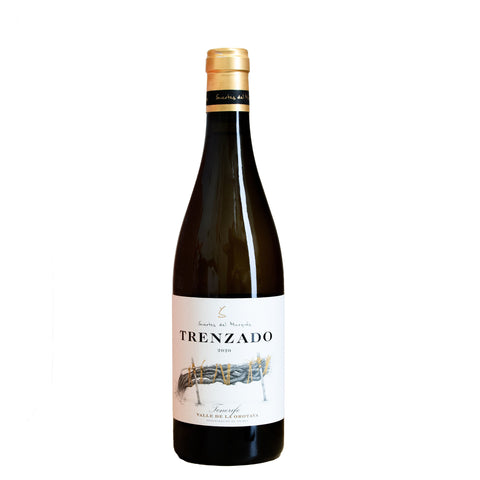
2020 Suertes del Marqués, Valle de la Orotava “Trenzado” Blanco Tenerife, Canary Islands, Spain
Putting your nose in the glass is like smelling a volcano, smoky and leesy with mineral highlights. The palate is serious, fresh and harmonious, pungent, with tasty, almost salty notes.
ABOUT THIS WINE
The grapes come from many different plots of very old vines - many ungrafted and over 100 years old. The vines are cordon trenzado or braided - this is a traditional method of viticulture. The vines grow in volcanic soils and all work in the vineyard is done by hand. The estate is practicing organic.Wild yeast fermentation in concrete tanks. The wine ages for 9 months in 500 liter used French oak foudres.
ABOUT THIS PRODUCER
Visiting the vineyards of Suertes del Marques is like going back in time. The area is Phylloxera free and so the vines are pie franco (own rooted) and extremely old, with some potentially over 200 years! Many of the vines are trained using a unique method to this area called Cordon Trenzado where the vines spread out in long braids of wood, some up to 15-20 feet from the mother trunk! The varietal mix here is like a treasury of lost and little know grapes: Listan Negro and Blanco, Malvasia Rosado, Vijariego, Baboso Negro and more, about 80% red and 20% white.
Given the extremely special nature of what Suertes del Marques possesses, proprietor Jonatan Garcia Lima works all his vineyards organically and all by hand and with the utmost care and respect for nature and the history. And from these amazing and unique vineyards, he endeavors to make fresh, tensile and mineral driven wines that showcase the volcanic soils and the native varieties. To achieve his objective, through years of experimentation and refinement, he has divided up the slope into parcels to achieve a hierarchy (much like a slope in Burgundy) as well as a unique vineyard signature to each of his top Cru wines. These various parcels have names like El Ciruelo, El Chibirique, El Esquilon and La Solana. The parcel wines are also grouped by soil type, with gold capsules indicating more "sandy" soils and silver capsules more clay over the bedrock of volcanic subsoils.
To achieve the utmost purity and refinement to the wines, all work in the cellar is done with a minimum of interference. This includes all indigenous yeast fermentations, use of neutral large oak barrels with minimal racking and added sulphur during the élévage. He also is a believer of using a decent percentage of whole clusters in fermentation for these native varietals, having been inspired by tasting and visiting in areas like Burgundy and the Rhone Valley. At bottling, there is also a minimum of filtration with the wines just passing through a large screen to remove any unwanted remnants, stems, grape skins, etc.
The resulting wines are super pure, and without artifice. They most certainly reflect the terroir from which they come. On both the reds and whites, they are fresh and bright with a strong underlying volcanic minerality, which Jonatan says can sometimes be misconstrued as reduction. Nonetheless,the wines themselves can sometimes be a little reduced, particularly in the months after bottling given the minimal racking and low SO2. If so, he recommends a nice decant before serving. He says. "if I wanted to make simple, fruity wines, without this pronounced 'Volcanic' character, I would have to use artificial yeast and new oak!" Obviously, not the kind of wines he or we are looking for from this unique terroir! All in all, these are extremely versatile wines and can pair beautifully with a range of foods.
In years to come, these wines from these special and often ancient parcels could become as famous as the greats in France and Italy. Perhaps someday, more people like George Washington and Sir Toby Belch¹s character in Twelfth Night will be calling for a ‘Cup of Canary¹?!
Details:
| Grape(s) | Listan Blanco and 5% others |
| Farming | Organic |
